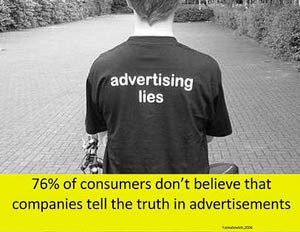
I’ve been working away in the background on a series of blogs focussed upon how CSR reporting is addressed across the world. Unexpectedly, this is the first in that series.
Out of the blue a colleague emailed me a copy of an article written by Niels Jørgen Langkilde, Director of the Copenhagen Climate Network Secretariat and a former Danish MP.
The article highlights new advertising guidelines due to come into force in Denmark next year which are so stringent they make it all but impossible for a compay to claim it or its services or products are “sustainable”, “green” or “environment-friendly”.
This is truly stunning.
While businesses clamour for Copenhagen to establish a post-Kyoto climate change framework within which companies can operate, the host country is setting the bar so high its own companies will not be able to demonstrate their responsibility.
The Old Chestnut: How Do You Measure Sustainability?
The inevitable question has to be “why?” The guidelines go on to state:
“At present, no methods are available to measure the concept of “sustainability” … therefore, general claims regarding sustainability are typically unclearly and imprecisely worded and should not be made”
This is a fair point. The definition of sustainability is pretty well settled but there is no all embracing way of measuring a company’s sustainability, only a host of bits which tend to get corralled into the corner of its business operations and labelled “CSR”.
However, rather than effectively banning most of its companies from claiming to be sustainable, shouldn’t the Danish government engage with them to try and create truly sustainable businesses?
The Old Troll : Greenwash
I suspect that at the bottom of all these efforts lies that age-old troll of companies’ sustainability efforts: Greenwash.
A further phrase in the guidelines states:
“… words and sentences (should) be taken at face value. Environmental or ethical claims in marketing should therefore be correct and precise and exaggerations as to the company’s or the product’s ethical qualities or positive effects should be prohibited.”
Quite right too, but as the article goes on to show, surely such inaccuracies are already covered by existing marketing legislation?
And here, I think lies the rub. There are far more differences between the different cultures which make up the western world than we usually care to remember, but one thing we all have in common is cynicism.
Lies, Damn Lies, And Advertising

We have all become somewhat inured to advertising and marketing, but it works in very subtle ways. Brand managers know that you’re more likely to buy a brand you recognise than one you don’t, so they just keep on shoving it front of your face.
Lifestyle advertising is very well known, selling a dream to the aspirational majority: hence Oxo’s obsession with family life and Gold Blend’s with hopeless romantics.
But it’s the “scientific proof” which really makes you view advertising with a jaded eye. For example, “healthy looking hair” (I want healthy hair, not glossy stuff which falls out when I’m 60) or “63% of women said it worked for them” (er, and the other 37%? Umm, any side effects?). Neither of these inspire great confidence if you think about them too long.
A few years ago I spotted a major international airline which was trumpeting the large amount of money it was giving to impoverished communities around the world. A small bit of research, and I discovered this amount was less than the amount of money it spent keeping its aircraft flying for one day.
“We donate £320m” sounds impressive. “We donate 0.03% of our turnover” does not. It’s about telling you what will support the advertising pitch, which is not necessarily the whole truth. Is this responsble?
The Danish Lesson
So if there is one lesson these Danish proposals on the use of “sustainable”, “green” or “environment-friendly” teach us it is this: sustainability and CSR reporting isn’t just about giving pots of money to worthy causes.
Nor is it about getting the PR message right within the traditional emotive landscape of advertising and marketing.
It is about companies being more honest and responsible in both their actions and their reporting of those actions; treating clients and customers like adults who can make up their mind in a rational way, not sheep to be hearded in the most profitable direction.
We should applauded the Danes for setting the bar so high; and we should emulate their desire to ensure only the least hyped and most accurate can claim to be sustainable or responsible.
Photo Credit: Advertising lies (via Tugce Esener) by jeffmcneill from flickr under Creative Commons Attribution Share Alike License.
A former CTO, Chris has a broad and varied background. He’s been involved with blue chips, consultancies & SMEs across a wide variety of sectors and has worked in Europe, the Middle East and Australia.
In 2007 he decided to combine his knowledge of business and IT with his passion for all things sustainable and has been busy writing ever since. However, his greatest ambition remains to brew the perfect cup of coffee.


